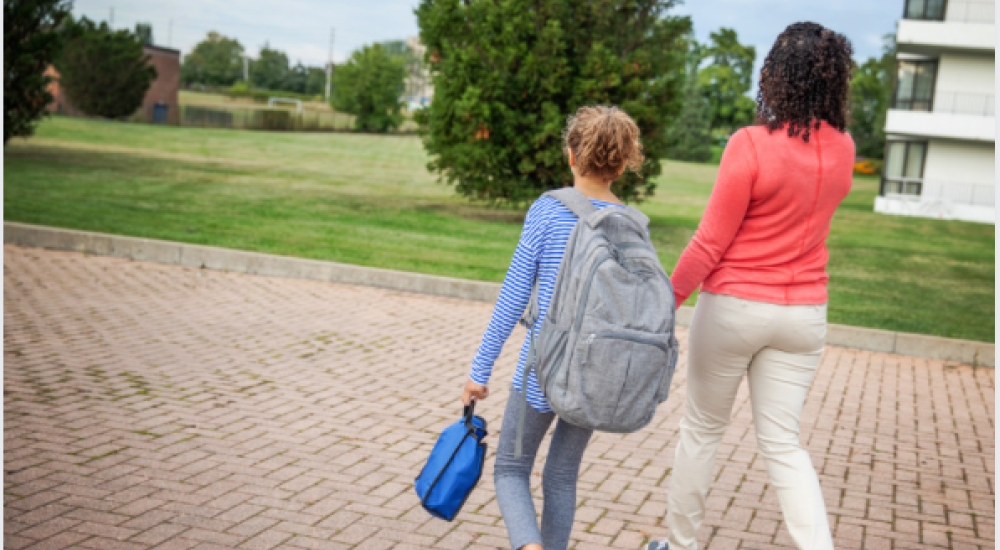
Many families are understandably feeling anxious about the return to school in 2021. For parents and caregivers who are sending their children back to school in-person, the good news is that there’s actually a number of concrete things you can do to make sure the transition back to school is a successful one for you and your child.
Dr. Rosalind Catchpole, Dr. Sarah Anderson, Psychologists at BC Children’s Hospital and Dr. Alex DiGiacomo, Post-Doctoral Fellow, BC Children’s Hospital and UBC, share some tips below for BC families:
- Expect some pandemic fatigue - Transitions can be challenging for kids at the best of times. When you throw in a pandemic that has ushered in uncertainty at every turn, as well as caused disruption for kids’ social, academic, and extracurricular lives for many, many months, it makes sense that kids and parents alike would be feeling burnt out and out of sorts. Model having compassion for yourselves and your kids and know that if things feel hard, it’s likely because things ARE hard!
- Identify what is still in your control and your child’s control - Focus on what’s in your
 control, rather than on the unknowns. While we all would prefer certainty, pandemic times are challenging our ‘flexibility’ muscles in addition to our ‘perseverance’ muscles. Practice what you can do in the short term (e.g., the coming days or weeks) and try not to look too far ahead. Focus on practical things that help to keep us all safe – like regular handwashing and staying home when sick – rather than on the ‘what ifs.’
control, rather than on the unknowns. While we all would prefer certainty, pandemic times are challenging our ‘flexibility’ muscles in addition to our ‘perseverance’ muscles. Practice what you can do in the short term (e.g., the coming days or weeks) and try not to look too far ahead. Focus on practical things that help to keep us all safe – like regular handwashing and staying home when sick – rather than on the ‘what ifs.’ - Confidence is key – As a parent, your confidence is an essential part of helping your child transition back to school successfully. Children pick up on our fear! If you find yourself doubting your decision, you might want to try writing down the reasons why you want your child to return to school and review them regularly. And most importantly, remember to communicate this confidence to your child – this will help both you and them keep anxiety in check. If you find yourself nervous about how a health condition may impact your child or family, it’s worth checking in with your family physician to make sure you have all the information you need to have confidence in your decision. Nothing is easy about this and it’s important that you as a parent feel supported.
- Help your child prepare for school return - There’s actually a lot you can do to help your child prepare for return to school. Practice your routines (for now) and stay flexible. This could include things like going over the home morning routine, practicing the route you’ll take the school, and even doing a practice ‘drop off’ so your child knows what to expect. Have your child meet up with a friend at a park – allow them an opportunity to connect socially again before seeing a friend back at school. Going through these steps a few times before school actually starts will help your child get ‘back in the swing of things.’ It probably isn’t a bad idea for you either! Starting to get your child’s sleep schedule back on a ‘school schedule’ and eating well with regular meals and snacks are also ways you can start to get your child ready for return to school.
- Expect some anxiety – Most families are likely experiencing some level of anxiety or stress as they prepare for the return to school. However, if you’re ready for it, your own and your child’s
 anxiety won’t throw you off as much. Try some mindfulness activities as a family, and get outside together for some family fun when you can. It can also be helpful to practice scenarios with your child to help them know how to manage anxious feelings that may arise (e.g. deep breathing, running around on the playground at recess), and how to tackle challenging situations that may come up once they start school (e.g., if they are wearing a mask outside on the playground at school and their friends are not, practice how they can respond to questions about this).
anxiety won’t throw you off as much. Try some mindfulness activities as a family, and get outside together for some family fun when you can. It can also be helpful to practice scenarios with your child to help them know how to manage anxious feelings that may arise (e.g. deep breathing, running around on the playground at recess), and how to tackle challenging situations that may come up once they start school (e.g., if they are wearing a mask outside on the playground at school and their friends are not, practice how they can respond to questions about this). - Reach out for help if you need it - It’s not a sign of failure or weakness to need some help ever – and especially now. So many families are nervous about back to school, and understandably so. Connect with the BC Children’s Kelty Mental Health Resource Centre to talk to a family peer support worker, or talk to your family doctor or the administration or counsellors at your child’s school. Also have support networks in place for you as a parent or caregiver. Find a friend who will listen, keep you positive, and lift you up – and you can do the same for them! Social connection is essential for this hard work and we are stronger together. If your child is struggling and needs additional support, contact your local Child & Youth Mental Health team about mental health services available to them.
Let’s be kind as we navigate this return to school. To ourselves – because this isn’t easy! To our kids, who may also be nervous and may not have had a lot of social contact during the pandemic, and finally to our kids’ teachers who are also navigating this alongside us.
Additional Resources:
- If you are looking to learn more on COVID-19, testing, vaccinations, and K-12 Schools and COVID-19, see the BC Centre for Disease Control website.
- Watch one of our webinars for more information and tips:
- Join our upcoming webinar on Sept. 14, 2021: Back to School: How to Promote Resilience and Set your Kids up for Success
- If your child is refusing to go to or stay at school due to anxiety or related challenges, watch our webinar series for parents of both elementary and high-school aged students: https://keltymentalhealth.ca/school-attendance-webinars (note: recorded in Fall 2020)







